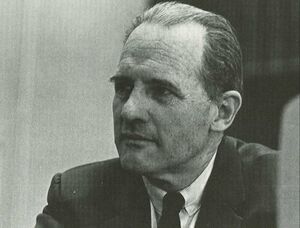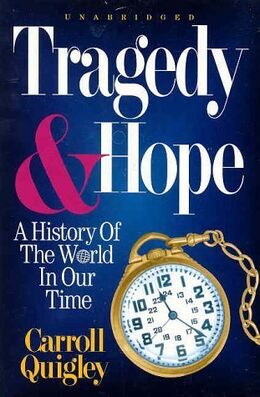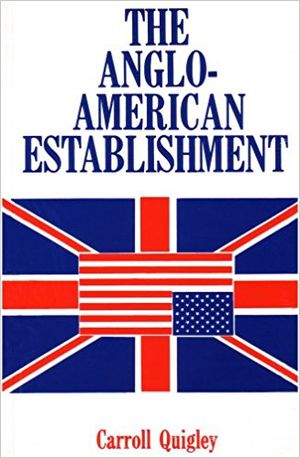Difference between revisions of "Carroll Quigley"
(→The Anglo-American Establishment: Alfred Zimmern) |
|||
| Line 35: | Line 35: | ||
===''The Anglo-American Establishment''=== | ===''The Anglo-American Establishment''=== | ||
{{FA|The Anglo-American Establishment}} | {{FA|The Anglo-American Establishment}} | ||
| − | Carroll Quigley wrote the ''[[The Anglo-American Establishment]]'', a study of anglophone [[deep politics]]. This focuses particularly on the evolution of the [[UK deep state]] about a century ago. The [[Milner Group]] lists on this website were derived from it. | + | Carroll Quigley wrote the ''[[The Anglo-American Establishment]]'', a study of anglophone [[deep politics]]. This focuses particularly on the evolution of the [[UK deep state]] about a century ago. The [[Milner Group]] lists on this website were derived from it. His information about the group was derived from an unnamed insider, whom [[Stanley Monteith]] identified as [[Alfred Zimmern]], who left the group in 1922. |
{{SMWDocs}} | {{SMWDocs}} | ||
Revision as of 15:47, 2 May 2022
(Academic, Historian, Statecraft/Analyst) | |
|---|---|
 | |
| Born | 1910-11-09 Boston, Massachusetts |
| Died | 1977-01-03 (Age 66) Washington DC |
| Alma mater | Harvard University |
| Exposed | • UK Deep state • US Deep state |
| Interests | US/Deep state |
| Interest of | Stanley Monteith |
Carroll Quigley was a US historian and deep political researcher who had unprecedented access to the archives of the Trilateral Commission, which he used to expose the UK/US Deep state[citation needed] John Taylor Gatto termed him "a superb writer and thinker".[1]
Contents
Opinions
Quigley stated that he was in broad agreement with the designs of the elite groups he studied, but disagreed that they should keep their activities secret, hence his publication of books about them.[citation needed]
Publications
Quigley researched the histories of the UK deep state the US deep state, which he collectively termed "The Anglo-American Establishment".
Tragedy and Hope
- Full article: Tragedy and Hope
- Full article: Tragedy and Hope
Quigley produced Tragedy and Hope, a pioneering expose of the US deep state which sold out very quickly, after which the publishers destroyed the plates.[2] It was suppressed and very hard to find for many years.[3][4]
This book was nevertheless highly influential on an older generation of truth seekers, including John Taylor Gatto. Gatto, by his own account, spent 6 months seeking the book and after finding one in the rare book room of New York library, had it stolen before returning it some months later.[1]
The Anglo-American Establishment
- Full article: The Anglo-American Establishment
- Full article: The Anglo-American Establishment
Carroll Quigley wrote the The Anglo-American Establishment, a study of anglophone deep politics. This focuses particularly on the evolution of the UK deep state about a century ago. The Milner Group lists on this website were derived from it. His information about the group was derived from an unnamed insider, whom Stanley Monteith identified as Alfred Zimmern, who left the group in 1922.
A Document by Carroll Quigley
| Title | Document type | Subject(s) | Description |
|---|---|---|---|
| Document:The Milner Group in Word War II | Wikispooks Page | WW2 Milner Group | The concluding chapter of Quigley's magnum opus on the Milner Group. |
Quotes by Carroll Quigley
| Page | Quote | Date | Source |
|---|---|---|---|
| The Anglo-American Establishment | “The argument that the two parties should represent opposed ideals and policies, one, perhaps, of the Right and the other of the Left, is a foolish idea acceptable only to the doctrinaire and academic thinkers. Instead, the two parties should be almost identical, so that the American people can "throw the rascals out" at any election without leading to any profound or extreme shifts in policy. … Either party in office becomes in time corrupt, tired, unenterprising, and vigorless. Then it should be possible to replace it, every four years if necessary, by the other party, which will be none of these things but will still pursue, with new vigor, approximately the same basic policies” | 1966 | |
| Tragedy and Hope | “For the first time in its history, Western Civilization is in danger of being destroyed internally by a corrupt, criminal ruling cabal which is centered around the Rockefeller interests, which include elements from the Morgan, Brown, Rothschild, Du Pont, Harriman, Kuhn-Loeb, and other groupings as well. This junta took control of the political, financial, and cultural life of America in the first two decades of the twentieth century.” | 1966 | Tragedy and Hope |
| UK/Deep state | “One wintry afternoon in February 1891, three men were engaged in earnest conversation in London. From that conversation were to flow consequences of the greatest importance to the British Empire and to the world as a whole. For these men were organizing a secret society that was for more than fifty years to be one of the most important forces in the formulation and execution of British imperial and foreign policy.” | The Anglo-American Establishment |
Related Document
| Title | Type | Publication date | Author(s) | Description |
|---|---|---|---|---|
| Document:Afterword to "Who Really Killed Chris Hani?" | Book | 29 February 2024 | Christopher Nicholson | Courts have decided that freedom of expression trumps all other rights as without it nobody, including the courts, would ever hear of breaches of other rights. So those who have attempted to suppress this book have prevented the world from discovering and prosecuting the criminals, who perpetrated the foul murders. In law we would describe them as accessories after the fact of these killings. |
References
- ↑ a b The Ultimate History Lesson Hour #3
- ↑ http://archive.today/2020.12.02-031418/http://www.carrollquigley.net/Interviews/Carroll_Quigley_1974_Interview_Transcript_Part2.htm
- ↑ https://tragedyandhope.com/tragedy-and-hope-professor-carroll-quigley/ saved at Archive.org saved at Archive.is
- ↑ http://www.carrollquigley.net/biography/The-Professor-Who-Knew-Too-Much.htm saved at Archive.org saved at Archive.is

